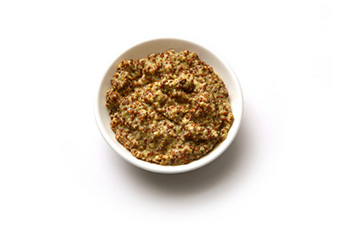It's easy to get answers about health and nutrition! Just send your question by email to [email protected] and Dr. Harlan will respond to selected questions of general interest. Answers will be posted in the Ask Dr. Gourmet newsletter (sign up now!) and archived in the Ask Dr. Gourmet section of the website.
Please note that the Ask Dr. Gourmet feature is restricted to questions regarding food and nutrition. Due to the many questions we receive, not all questions may be answered. For more specific questions about your individual health, please contact your doctor. About Timothy S. Harlan, MD, FACP, CCMS | Terms of Use | Privacy Policy
Ask Dr. Gourmet
How much Vitamin K is in mustard?
Is yellow mustard safe for Coumadin (warfarin) users?
Dr. Gourmet Says...

The USDA database reports that prepared yellow mustard - the standard, smooth yellow mustard - contains 0.1 micrograms of Vitamin K per teaspoon. This would be considered a low amount and would be safe for those taking Coumadin (warfarin). One teaspoon of plain, ground mustard seed (not prepared) contains 0.1 micrograms of Vitamin K, so adding whole, unground mustard seeds to plain mustard, making coarse ground mustard, is unlikely to add a measurable amount of Vitamin K to your intake unless you were drinking it instead of spreading it on your sandwich.
Mustard greens, on the other hand, are very high in Vitamin K, at 144 micrograms per cup of chopped greens.
Other common condiments may be a concern. While ketchup (catsup) is low in Vitamin K at 0.5 micrograms per tablespoon, mayonnaise should be approached with caution as it contains 22.5 micrograms of Vitamin K per tablespoon. The type made with olive oil (rather than canola oil, which is higher in Vitamin K than olive oil) is safer, at 8 micrograms per tablespoon.
It's important for you to know that because food companies are not required to put Vitamin K content on their Nutrition Information labels, they do not provide that information to the USDA for the USDA nutrition database - indeed, often the companies do not test for Vitamin K content at all. Do not assume that you know the Vitamin K content of a prepared food such as mayonnaise when that food can be prepared in ways that can result in such great variation in Vitamin K content.
If you like your mayonnaise, that doesn't mean you should avoid it, however - just be sure you consume about the same amount every day so that your Vitamin K intake is consistent. (And enjoy your mustard without worry.)
Thanks for writing,
Timothy S. Harlan, MD, FACP, CCMS
Dr. Gourmet
